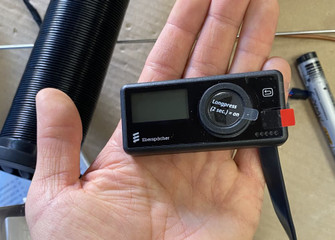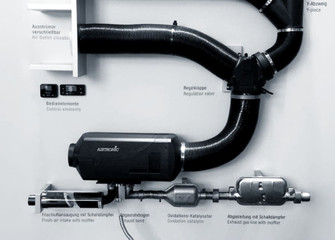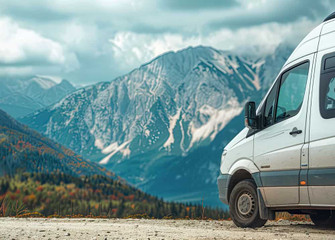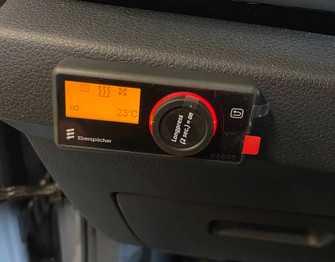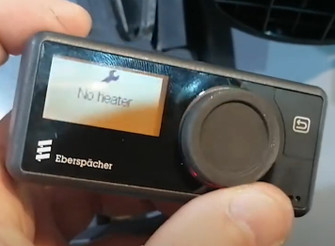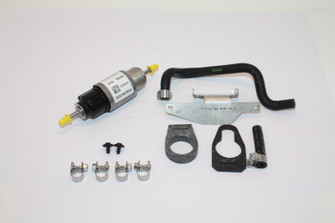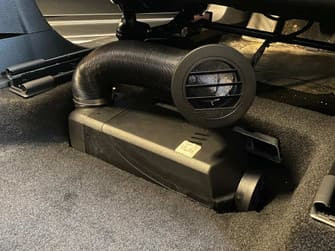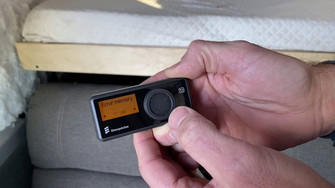Winter Van Life Essentials: Heaters, Insulation, and More
Posted by Heatso on 27th Sep 2024
For van lifers, winter presents a bunch of challenges. Full-time winter camper living demands careful preparation and detailed planning.
Staying warm and comfortable becomes a top priority when it gets cold, and this is where the right supplies come into play.
WINTER VAN LIFE ESSENTIALS: HEATERS, INSULATION, AND MORE
For van lifers, winter presents a bunch of challenges. Full-time winter camper living demands careful preparation and detailed planning.
Staying warm and comfortable becomes a top priority when it gets cold, and this is where the right supplies come into play.
In this guide, we'll look into the most essential elements of winter van life, from effective insulation to the air and water heaters. Winter van life essentials aren't just nice-to-haves, they're necessary for safety and comfort.
ON THIS PAGE
INSULATING YOUR WINTER CAMPER VAN
Importance of Proper Insulation
When it comes to surviving the hardships of winter van life, insulation plays an important role. Proper insulation ensures that your van keeps heat in, keeping you warm when it's cold outside.
It not only keeps you cozy but also helps save on energy consumption, saving you money and making you more eco-friendly. Insulation keeps the cold out and prevents drafts and condensation.
With the right insulation in place, you'll be able to stay comfortably warm even when winter's temperatures drop.
Using Foam Boards for Insulation
One of the recommended methods for insulating your winter camper van is using foam boards. They're lightweight and easy to work with, yet they're effective.
Foam boards provide excellent thermal resistance, trapping warm air inside and keeping the cold out. By strategically installing foam boards in your van's walls, ceiling, and flooring, you create a thermal barrier that makes your motorhome more comfortable.
It's a cost-effective way to keep warm and cozy during your chilly adventures in your winter van.
Woven Fabric Insulation for Winter Camping
Wowen thermoplastic fiber insulation is another great way to insulate your van for chilly winter nights. Autoply offers insulation options for the most popular van conversions, such as Mercedes Sprinter, Ram Promaster or Ford Transit.
Getting high-quality insulation and cutting it precisely to fit your van conversion is a time-consuming task. The advanced insulation offered by AutoPly is pre-cut for these some of the most popular vans on the market, solving this problem once and for all.
Kits made by AutoPly are designed with the user's comfort in mind. Its advanced thermal and acoustic woven fabric keeps all the heat inside. This type of insulation is also effective in reducing noise and vibrations, ensuring a quiet sleeping environment.
A woven insulation fabric is allergy-free, mildew- and bacteria-resistant, and contains no fiberglass, which makes it probably the best choice for insulating your van for winter.
Top Tips for Effective Insulation
The key to getting great insulation in your van is paying attention to details and following some expert tips. Start by thoroughly sealing any gaps or cracks in your van's construction to prevent heat loss.
Ensure that all windows and doors are properly sealed. When installing foam boards, pay special attention to corners and seams, where heat often escapes.
By combining these techniques and learning from the wisdom of experienced winter van lifers, it's easy to make your winter home cozy.
EFFECTIVELY COMBINING HEATING SYSTEMS WITH INSULATION
Combining heating systems such as diesel or petrol air heaters and water heaters with the right insulation is a winning formula for staying warm and comfortable during your winter van life adventures.
These heating systems provide a constant source of warmth, and insulation keeps that heat in. To achieve the perfect balance, start by making sure that your van is well-insulated.
Once your insulation is in place, consider strategically placing your air heater vents and water heater outlets to maximize heat distribution.
By directing warm air towards the most heavily insulated areas, you can increase the efficiency of your heating system. Also, make sure you have good ventilation so condensation doesn't form.
With the right combination of active heating and insulation, you'll create a winter camper van that's not only warm but also energy-efficient, so you can fully enjoy winter camping.
MASTERING THE HEAT IN YOUR CAMPER DURING WINTER
Diesel Heaters
Camper living in winter is tough without a diesel heater. Diesel heaters are highly recommended for living in a van during the winter due to their many advantages.
They burn diesel fuel to generate heat efficiently, giving you a reliable source of heat. They are known for their exceptional heating performance, making a chilly van cozy in no time.
During extended winter trips, their low fuel consumption saves you money, and their safety features make sure you stay protected.
Choosing a diesel campervan heater may be the best option if your van runs on diesel. There is no doubt that Webasto heaters are your best option.
Webasto Air Top 2000 STC 12V Diesel Heater Kit is an excellent choice for winter heating, as it provides an extremely efficient heating performance for your winter travels.
Petrol Heaters
Petrol heaters offer an alternative heating solution for winter van life. These heaters use gasoline instead of diesel.
Despite being less common than diesel heaters, petrol heaters can still keep your van warm during cold weather. Petrol heaters offer benefits such as portability and easy operation.
They are usually compact and can be conveniently installed in various van models. Petrol heaters can provide reliable heating, and their availability may be advantageous in regions where diesel fuel is less accessible.
Espar Airtronic AS3 B2L 12V air heater might satisfy even the pickiest van lifer. It is small, compact and suitable for altitudes up to 9800 feet (3km). This heater can operate in temperatures as low as -46°C / -50°F, which makes it ideal for winter road adventures.
Choosing Petrol or Diesel Heater
Winter van lifers typically choose between diesel and gasoline heaters according to their vehicle's fuel type. For example, vans commonly used for conversions, such as the Mercedes Sprinter, Ram Promaster, and Ford Transit, can operate on either diesel or gasoline.
Diesel heaters are often preferred for vehicles with diesel engines due to their efficiency and fuel availability, while petrol heaters are a better match for gasoline-powered van conversions. The key is to match the heater to your van's fuel type so it works flawlessly.
WATER HEATERS IN WINTER VAN LIFE
Winter van life is incomplete without a water heater, which provides you with hot water when it's cold outside.
You can't beat a warm shower and a hot cup of tea in winter. They're a must for staying comfortable and feeling good during your road trips.
Winter van lifers can choose from various water heater options, including propane, electric, or diesel heater, each with its own set of advantages.
Having a van equipped with a reliable water heater, you can ensure that you have access to personal hygiene, allowing you to enjoy your winter adventures.
Properly maintaining your water heater and pairing it with efficient insulation will ensure that you can enjoy hot water even in the coldest weather.
HEATER AND INSULATION MAINTENANCE IN WINTER
Winter-Specific Heater Maintenance Tasks
Proper maintenance of your heating systems is essential for a smooth winter van life experience.
In the cold months, it's essential to regularly inspect and clean your heaters, ensuring that they operate efficiently and safely.
Diesel and petrol heaters, for example, may require periodic servicing and exhaust system checks. Checking for leaks and performing system diagnostics can also prevent unexpected breakdowns.
A short trip won't be too bad if your van isn't heated, but imagine being stuck in your van for a long time in winter months. These kinds of problems can be prevented by properly maintained heaters.
Insulation Maintenance in Winter
As for insulation, routinely inspecting it for any signs of wear or damage is key. Addressing insulation issues on time guarantees that your van remains warm and cozy throughout your winter travels.
Insulation problems can be resolved by patching or replacing damaged areas and improving your insulation.
By staying proactive with maintenance and addressing issues promptly, you can ensure that your winter van life remains warm, comfortable, and trouble-free.
WEAK POINTS TO LOOK OUT FOR WINTER VAN INSULATION
Windows
The windows in your van building are thin and made of thermally conductive glass, so they will lose heat in the winter. By using insulated window covers, this can be avoided.
When you cover your windows, you lose their purpose. Due to this, we recommend using fewer and smaller windows in your van conversion.
The windows you do have should be double paned acrylic for maximum thermal insulation, and window shades should be used at night.
Front Area
There are a lot of weak points in the front area of the van because of the many windows and uninsulated side doors. Leaving this area open to the rest of your living quarters will result in the rear of your van suffering the same fate as the front.
Try closing off the front side from the living quarters in the back with a solid pocket door or insulating blanket.
Doors
Your van's rear and slider doors are likely to be covered with plastic factory coverings. Make sure you remove these, insulate inside, and replace your covers.
ESSENTIALS FOR WINTER CAMPER LIVING
Winter van life can be hugely rewarding, and good insulation with an efficient heater plays a big part in making it convenient and enjoyable.
Insulation keeps you cozy and saves resources, lowering costs, and reducing energy usage. Insulation, air heater, and water heater are all essential.
If you have the right supplies, you can enjoy your mobile home in comfort. Make your winter road trip a success by choosing the best ones.

